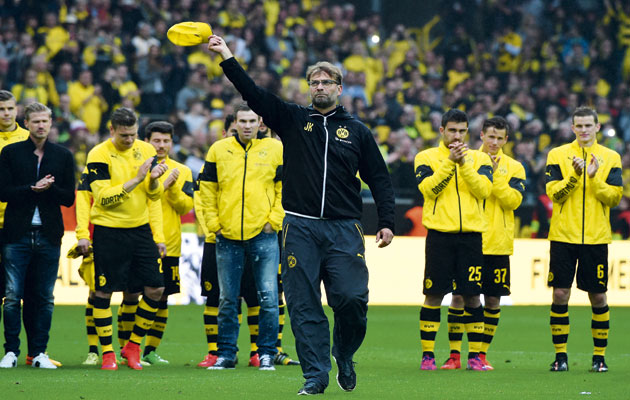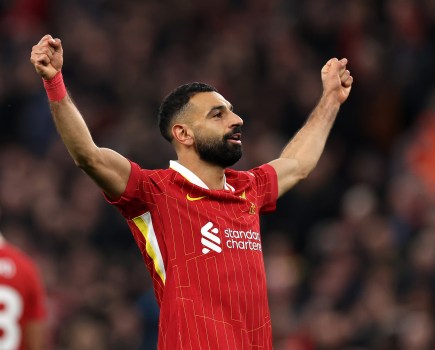As Bayern Munich coach extraordinaire Pep Guardiola will surely confirm, even winning a championship is sometimes not enough in the pressurised environs of the Bavarian masters.
When Bayern clinched the Bundesliga title in late April, the 25th championship in the club’s history, there was much for the Spaniard to be satisfied with. His team were victorious in 24 of their 30 games up until that point and had only twice tasted defeat. Their intoxicating brew of collective harmony, fluidity, imagination, defensive rigour and utter consistency had proved far too potent for most of the league. And taking into account the 11 players they had on World Cup duty in Brazil, their energy and hunger was, at times, remarkable.
The statistics and the raft of Bundesliga records tell their own story of Bayern’s hegemony. The miserly 18 goals conceded; the 22 clean sheets; the 13 consecutive games in the “Autumn Championship” without letting in a goal; the 11-point lead they had over second-place Wolfsburg at the winter break.
In seven years as a head coach, Guardiola has won 19 trophies, and in each of his two seasons at the Allianz-Arena he has scooped the domestic league spoils. But, unfair on him or not, German league titles tend to be regarded as the bare minimum in these parts. With everything going wrong for Bayern in the last month of the season – beaten on penalties by Borussia Dortmund in the semi-final of the German Cup, falling to Barcelona in the last four of the Champions League and losing three straight dead rubbers in the Bundesliga – Guardiola inevitably found himself under heavy fire.
Unfavourably compared to his predecessor Jupp Heynckes – who just happened to win the treble in his final campaign – Guardiola was mainly taken to task for overdosing on rotation and tactical tinkering. He had also had to tetchily field a myriad of other accusations: that his players lacked physical conditioning and were prone to fade late in games; that he was diluting the Bayern identity with too many Spaniards (five players plus technical staff); and that he did not get on with a number of players, notably Mario Gotze, Franck Ribery, Thomas Muller and Bastian Schweinsteiger.
While Guardiola could argue with some justification that the fates conspired against him, that the Barca tie might have turned out differently if three of his liveliest performers – Arjen Robben, David Alaba and Ribery – had not been sidelined with injury, he certainly did bring some of the press attacks on himself. His uncompromising nature caused no little friction and a perfect example was his long-simmering clash with veteran club doctor Hans-Wilhelm Muller-Wohlfahrt, who sensationally resigned in the spring after claiming that Guardiola had blamed the medical department for a Champions League defeat at Porto.
World-renowned orthopaedist Muller-Wohlfahrt was part of the Bayern furniture for almost four decades. He was widely seen in the Bavarian capital as the victim in the affair – and whatever Guardiola’s concerns about injury recovery rates and MW’s lack of presence on the training ground, he should have handled it with more finesse and tact.
Guardiola, for whom next season will probably be his last at Bayern, will have to be careful. After all, it was control freakery and a disregard for local mentalities which led to the demise of Jurgen Klinsmann back in 2009.
Whichever way it is cut, this season will always be regarded as an annus horribilis for coaching superstar Jurgen Klopp.
After a half-dozen years on the up and up with Dortmund, his team suddenly and shockingly went into freefall. By Christmas they were second bottom, undone by a spate of defensive howlers, a vulnerability to counter-attacks and failure to turn possession into goals.
Plagued by injuries to such key players as centre-back Mats Hummels, midfield hub Ilkay Gundogan and attacker Marco Reus, Dortmund this term often seemed to lack the zip and sheer fearlessness of yore. There can be no hiding from the fact that last summer’s recruitment drive was a disaster, with young German central defender Matthias Ginter, Italian striker Ciro Immobile and Colombian front runner Adrian Ramos all ending up in their own personal Bermuda Triangle.
For the first time, Klopp’s philosophy became subject to sustained and virulent scrutiny. Despite his team improving in the second half of the campaign – finishing seventh in the Bundesliga and reaching the German Cup Final – an era was clearly drawing to a close at the Westfalenstadion,. Those dark days of the autumn and winter clearly took their toll, prompting
the 47-year-old to announce in April that he would be stepping down at the end of the season.
The news that the seven-year Klopp reign was over undoubtedly was the Bundesliga story of the season. Adored in Dortmund for his authenticity, humour and emotion, he not only brought the club untold success – two Bundesliga titles, a German Cup and the runners-up spot in the 2013 Champions League – but he also instigated a footballing revolution, his young guns rarely failing to thrill with their aggressive, frenzied and high-tempo style.
Klopp’s successor, the former Mainz boss Thomas Tuchel, undeniably has a hard, if not impossible, act to follow. Even with Hummels and Reus opting to stay loyal, the Dortmunder first XI will have to be extensively rebuilt, and it remains to be seen how easy it will be to go from the direct Klopp blitzkrieg to Tuchel’s favoured possession game.
Of all the coaches operating in the Bundesliga this term, no one flopped more dramatically than Roberto Di Matteo at Schalke. Appointed in October to replace the sacked Jens Keller, the former Chelsea manager might have been a Champions League winner with the Londoners in 2012, but he never got to grips with the volatile Gelsenkirchen scene and after finishing two places short of Champions League qualification, he walked before he could be pushed.
Winning only 14 of his 33 competitive games and without an away victory in the Bundesliga this year, Di Matteo was the exact opposite of what Schalke fans look for in a boss. He preached discipline and caution; they wanted full-blooded attack. He was cool, calculating and undemonstrative; they yearned for passion.
Not that Di Matteo was entirely to blame. A few bad apples in a squad can cause no end of damage and Schalke plainly had their share of the egomanical, the unproductive and the disruptive. A couple of weeks before the end of the season, midfielder Kevin-Prince Boateng and winger Sidney Sam had the dubious distinction of being kicked off the team
for disciplinary reasons, but by then, of course, it was far too late.
One of the most salient lessons of the 2014-15 Bundesliga is the heights which can be scaled success when a coach and director of sport work hand-in-glove to execute an intelligent plan.
Augsburg’s Markus Weinzierl and the former German World Cup winner Stefan Reuter made light of a shoestring budget to steer their upstart club to a brilliant fifth-place finish. The Borussia Monchengladbach brains trust of master tactician Lucien Favre and sharp-eyed talent-spotter Max Eberl intelligently laid the foundations for a superb bronze medal, a chance to rediscover the Champions Cup/Champions League after 37 long years.
Runners-up to Bayern, albeit 10 points to the rear, Wolfsburg too had an outstanding leadership tag-team in coach Dieter Hecking and CEO Klaus Allofs. Though it’s fashionable to solely attribute their success to the huge investment of parent company VW, that’s not the whole story. Over the last year or two, Hecking has added a much cuter tactical edge,
and when it comes to farsighted business programmes and transfer market work, Allofs has no peers.
The Wolves were exceptional at switching defence into attack in the blink of an eye and striking early in a game, while another of their great strengths was their highly impressive “spine”, the axis of Swiss goalkeeper Diego Benaglio, Brazilian central defender, Naldo, Belgian attacking midfield ace Kevin De Bruyne and reborn Dutch striker Bas Dost.
It was a good time to be an anti-relegation firefighter. Michael Frontzeck arriving just in the nick of time to save Hanover; Pal Dardai steadying the ship at Hertha Berlin; Huub Stevens eventually pulling Stuttgart away from the cliff’s edge with three wins in the last three weeks of the season and Bruno Labbadia somehow keeping the severely-holed Hamburg afloat thanks to victory over Karlsruher in a promotion/relegation play-off.
A word to the wise: change your coach if you want to survive. Freiburg and Paderborn chose not to read the runes and, for their pains, ultimately fell through the trapdoor.
PLAYER OF THE SEASON
Kevin De Bruyne (Wolfsburg)
Moved this term from a wide position to a freewheeling central role, the Belgian creative midfielder made a mammoth contribution to his team’s Bundesliga pre-eminence, scoring ten and setting up 21.
COACH OF THE SEASON

Lucien Favre – Borussia Monchengladbach
The Swiss chessmaster arguably is the best analyst and tactician in the country and could well be a contender to take over from Guardiola when he does leave Bayern.
NEWCOMER OF THE SEASON
Davie Selke – Werder Bremen
It says everything about the calibre of the 20-year-old striker that he looked anything but a rookie this term. Will he come to regret his recent decision to move to second division RB Leipzig.
TEAM OF THE SEASON
Bernd Leno (Leverkusen); Paul Verhaegh (Augsburg), Jerome Boateng (Bayern), Naldo (Wolfsburg), David Alaba (Bayern); Gonzalo Castro (Leverkusen), Granit Xhaka (Gladbach); Arjen Robben (Bayern), Kevin De Bruyne (Wolfsburg), Patrick Herrmann (Gladbach); Robert Lewandowski (Bayern).
CUP WINNERS
Dortmund had hoped to bid farewell to coach Jurgen Klopp with victory in the Final in Berlin, but it all ended in an anticlimax as they were thoroughly outclassed and outsmarted by Wolfsburg, whose 3-1 win was their first-ever triumph in the German Cup.
RELEGATED
Their debut in the top flight was a disaster as Paderborn simply did not have players with top-flight experience, while Freiburg were just too physically lightweight and defensively suspect.
PROMOTED
Ingolstadt and Darmstadt.
EUROPEAN QUALIFIERS
Bayern Munich (CL): Were dominance personified until easing off the accelerator with
the title in the bag.
Wolfsburg (CL): Their mix of expensive stars, hungry youngsters and the odd journeyman turned the VW’s Auto City into a metropolis of footballing excellence.
Bor M’gladbach (CL): The best counter-attacking team in the country were superb in 2015.
Bayer Leverkusen (CL): Coach Roger Schmidt did all that was asked of him in his first season in charge: a top-four finish, a Dortmund-like playing style and much more fighting spirit than in the past.
Augsburg (EL): Proof that even a club with the second-smallest budget in the league can be competitive. Expertly drilled by coach Markus Weinzierl, they were bold, brave and tough to outmanoeuvre.
Schalke (EL): A place in the Europa League won’t make up for the disappointment of missing out on the Champions League cash. Suffered from too little creativity.
Borussia Dortmund (EL): Jurgen Klopp’s high-energy side continue to outstrip most in a foot race, but were let down by their frailties at the back and indecision
in the attacking third.








